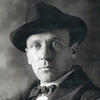Viktor Shklovsky (1893–1984)
Author of Zoo, or, Letters Not About Love
About the Author
A leading figure in the Russian Formalist movement of the 1920s, Viktor Shklovsky (1893-1984) had a profound effect on twentieth-century Russian literature
Image credit: http://www.lechaim.ru/ARHIV/129/sarnov.htm
Works by Viktor Shklovsky
Testimone di un'epoca 7 copies
Lettura del Decameron: dal romanzo d'avventura al romanzo di carattere — Author — 3 copies
Cine y lenguaje 3 copies
Za i protiv (beleške o Dostojevskom) 2 copies
Uskrsnuće riječi 2 copies
Capitaine Fédotov 2 copies
Il punteggio di Amburgo 1 copy
За сорок лет 1 copy
Sur la théorie de la prose 1 copy
Том 1: Революция 1 copy
El arte como artificio 1 copy
Sobranie sochineniˆi 1 copy
Bowstring 1 copy
I fratelli di Serapione 1 copy
I fratelli di Serapione 1 copy
Próza: úvahy a rozbory 1 copy
Associated Works
Tagged
Common Knowledge
- Canonical name
- Shklovsky, Viktor Borisovich
- Legal name
- Šklovski, Viktor Borisovitš
Шкловский, Виктор Борисович - Other names
- Sjklovski, Viktor
- Birthdate
- 1893-01-24
- Date of death
- 1984-12-8
- Gender
- male
- Nationality
- Russia
- Birthplace
- St. Petersburg, Russian Empire
- Place of death
- Moscow, Russia
- Places of residence
- St. Petersburg, Russia
- Education
- St Petersburg University
- Occupations
- literary critic
writer - Organizations
- Serapion Brothers
OPOYAZ (Society for the Study of Poetic Language)
Members
Reviews
Lists
Awards
You May Also Like
Associated Authors
Statistics
- Works
- 67
- Also by
- 2
- Members
- 1,045
- Popularity
- #24,651
- Rating
- 3.8
- Reviews
- 8
- ISBNs
- 94
- Languages
- 13
- Favorited
- 5















I speak in a voice grown horse from silence and feuilletons. I’ll begin with a piece that has been lying around for a long time.
The way you assemble a film by attaching to the beginning either a piece of exposed negative or a strip from another film.
I am attaching a piece of theoretical work. The way a soldier crossing a stream holds his rifle high.
It will be completely dry. Dry as a cough.
During the eighteenth century, and at the beginning of the nineteenth, to tell an anecdote meant to relate an interesting fact about something.
For instance, to relate that the Krupp factory is currently building a diesel engine with 2,000 horsepower in one cylinder would have been, from the viewpoint of that time, an anecdote. An anecdotal story, from the viewpoint of that time, was also a story consisting of separate facts tenuously connected. There were even such things as philosophical anecdotes.
Wit – the unexpected denouement, for instance – had no place in the anecdote of that time. Now we describe an anecdote as a short novella with a denouement. From our viewpoint, to ask after hearing an anecdote, “But what happened next?” is an absurdity, but then that is the viewpoint of our time.
In the old days, one anecdotal fact was normally followed by another. In the old anecdote, one responded above all to the attractiveness of the fact, to the material, whereas in the modern anecdote we respond mainly to the structure.
This conflict – or, rather, the alternation – of perception from one aspect of a work to another – can be traced easily.
I have no desire to be witty.
I have no desire to construct a plot.
I am going to write about things and thought.
To compile quotations.
The time has changed course once again and the word “anecdote,” once applied to a witty story, will soon be defined in terms of the various facts being printed in the this-and-that columns of the newspapers. Each separate moment of a play is becoming a separate, self-contained entity. Structure is usually missing. When it does creep into a piece of work, it is promptly killed; moreover the crime goes unnoticed by the public. And the crime is pointless: the victim is already dead. The interest in the adventure novel which we are now witnessing does not contradict the thought just expressed. What we have in the adventure novel is a type of “stringing” in which there is no orientation toward the connecting thread.
At the present time, we perceive memoirs as literature; we respond to them as something esthetic.
This is clearly not due to interest in the revolution, because people are avid to read even memoirs having nothing to do with the revolutionary epoch.
It goes without saying that plot-oriented prose still exists and will continue to exist, but it has been consigned to the attic.… (more)